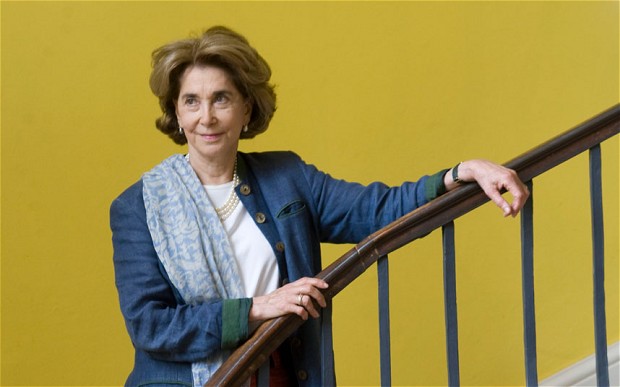Baroness Rawlings: ‘Our wage bill is £500,000 but we live off scraps’
Her funds-conserving suggestions induced a stir this week. But Lady Rawlings isn’t the only aristocrat counting the pennies 
Photograph: Martin Pope
As prime suggestions on how to make-do-and-mend go, they are definitely eccentric, in the best aristocratic tradition. Lady Rawlings, chatelaine of Westgate Hall, a Sir John Soane mansion in 38 acres of prime north Norfolk, has this week been sharing with Tatler readers the tricks of how she keeps her home expenses down.
These consist of offering Panama hats instead of a marquee for summer events, reusing the linen napkins from breakfast at luncheon, and recycling the crusts from the night before’s melba toast to make soldiers for her dippy egg in the morning. And no, this is not lifted out of the pages of PG Wodehouse.
If it is so hard to make ends meet, the rest of us non-blue-bloods would just accept the inevitable and promote up. And that is also the conclusion Lady Rawlings (in an additional lifestyle a severe-minded Tory frontbencher and former MEP) has reached. Johnny Depp is rumoured locally to have viewed the estate, when he was staying nearby with his good friend Stephen Fry, but it is nevertheless on the market place.
Disposing of the loved ones seat, even though, would be as criminal as bulldozing it for several owners of Britain’s historic houses. They believe that they hold the properties in a sacred believe in, custodians for a generation rather than anything at all so vulgarly middle-class as owners.
So they favor to struggle on, sparing the ruinously costly heating (if it functions) by shivering in hand-crocheted shawls and Barbours in what as soon as have been the servants’ quarters prior to they all had to be let go. While the hoi polloi take pleasure in tea and scones front of property, right after tramping round the state rooms and admiring the Previous Masters Great-Wonderful-Great Uncle Roly brought back from Europe right after his Grand Tour, his descendants scrimp and conserve on a price range much better suited to a Barratt home.
No matter whether this kind of privations are the outcome of getting imply – one concept has it that individuals who amass and then hold on to their cash only do so by remaining permanently tight-fisted – or out of necessity is challenging to judge. But a title and a historic property definitely really do not usually come with the wherewithal to maintain it ticking above.
Lord Longford, the eccentric Labour peer and penal reformer, grew up in the family’s Irish castle, but his children recall an upbringing so shaped by economic situations that they characterise people days as “look back in hunger”.
The extent of the strain on today’s aristocrats is revealed by Sir Richard FitzHerbert, ninth baronet and proprietor of the 400-12 months-outdated, 48-chimney Tissington Hall in Derbyshire. His expense-cutting measures, he confesses, even stretch to pocketing freebie biros each time he visits a hotel. “All these small issues aid,” he says. If only he had copyrighted that, or some thing like it, he might now be living off the royalties from Tesco.
Caroline Lowsley-Williams of Chavenage Residence, an Elizabethan manor in the Cotswolds, is blunt about the strains of retaining the previous place going by employing it out as a venue. “I wouldn’t want the wedding ceremony trade on anybody,” she laments. “We peaked one 12 months at 37. It helped the funds flow, but that meant 37 mothers-of-the-bride to deal with. I’m keener on funerals. They have a shorter run-in time.”
Lowsley-Williams, although, professes herself “pathetically grateful” if guests carry candles to dress their wedding tables. “I collect the ends feverishly once they’ve gone because they make this kind of great firelighters.”
Sir Benjamin Slade, the most recent in the line at the family’s 13th-century manor, Maunsel Home in Somerset, takes that one particular step more. “I dwell off scraps from weddings here. I go out and loiter after ten o’clock and they buy me drinks, so that is quite very good. Otherwise I always use tea bags twice. The fridges are full of every little thing, but if by mid-week it is run out, I just eat porridge made with water so I really don’t devote as well much. Our wage bill is £500,000 a year.”
But the make-do-and-mend spirit is about more than balancing the books. In a week that has witnessed survivors collect to mark the 70th anniversary of D-Day, we have been reminded of the wartime spirit that has by no means left them. And that consists of a waste-not-want-not technique to life, forged in an age of rationing and shortages.
The Queen, who joined the veterans, exemplifies that approach. Despite obtaining a private fortune estimated in the hundreds of millions of pounds, Her Majesty was filmed in a 2013 documentary chatting to the Prime Minister David Cameron in her private sitting space at Balmoral with just a £20 electrical convector heater in the ornate fireplace to maintain them warm against the unpredictable Scottish climate.
At Sandringham, like Balmoral, one particular of the Queen’s personal properties, a latest overnight visitor recounts being shown to a massive bedroom and advised that it was when Princess Margaret’s favourite. En suite was a lurid 1970s orange bathroom, installed for the Queen’s sister. In any 1 of the rows of million-pound houses in London’s wise quarters favoured by wealthy young pros, such an eyesore would have been ripped out decades in the past and replaced by the most recent have to-have super shower or Moroccan rustic tiles. But at Sandringham, utility is what counts. It performs, so why waste income changing it?
Lady (Fiona) Fraser grew up in the publish-war years amongst her Spencer mother’s ancestral property, Althorp in Northamptonshire, and her Douglas-House father’s family seat, The Hirsel in Scotland. She says that the austerity of the latter in specific – “no heating, frightful outdated lino on the bathroom floors” – had practically nothing to do with viewing the pennies. “It was far more of a reflex. Austerity came naturally. They turned the lights off as they left a space. They saved brown paper and string to reuse on parcels. Outfits have been patched and handed down. It was completed for its own sake, out of a devout Christianity and the belief that ostentation and waste had been morally wrong.”
It was the sort of upbringing, says Jane Fearnley-Whittingstall, writer of The Ministry of Foods: Thrifty Wartime Approaches to Feed Your Family members Right now, that has instilled what grew to become lifetime habits of economic system in her generation, no matter what your financial institution balance or price tag tag on your residence.
“I often leave a clean plate, even if it means chomping on a bit of gristle. I never throw away anything simply because it demands mending. And I make certain I locate new utilizes for things after they actually are worn out, so an old dress turns into cushion covers. It’s absolutely nothing to do with conserving funds. I’d truly feel guilty if I did not, though I have to confess to dropping the battle to darn socks with holes in the heels.”
All excellent, frequent sense, but the danger, she warns, is when it suggestions in excess of into something a lot more obsessive. “I keep in mind in my grandmother’s house there was a enormous wardrobe that was total to the leading with bars of soap.”
A harmless economic climate, maybe, but undeniably an eccentric one particular. Lady Rawlings could have saved her the trouble. Amount 9 on her checklist is “buy proper soap for visitors, but reuse it afterwards. When it is nearly completed, put it in drawers and cupboards to preserve the moths away.”
Additional reporting by Olivia Goldhill
